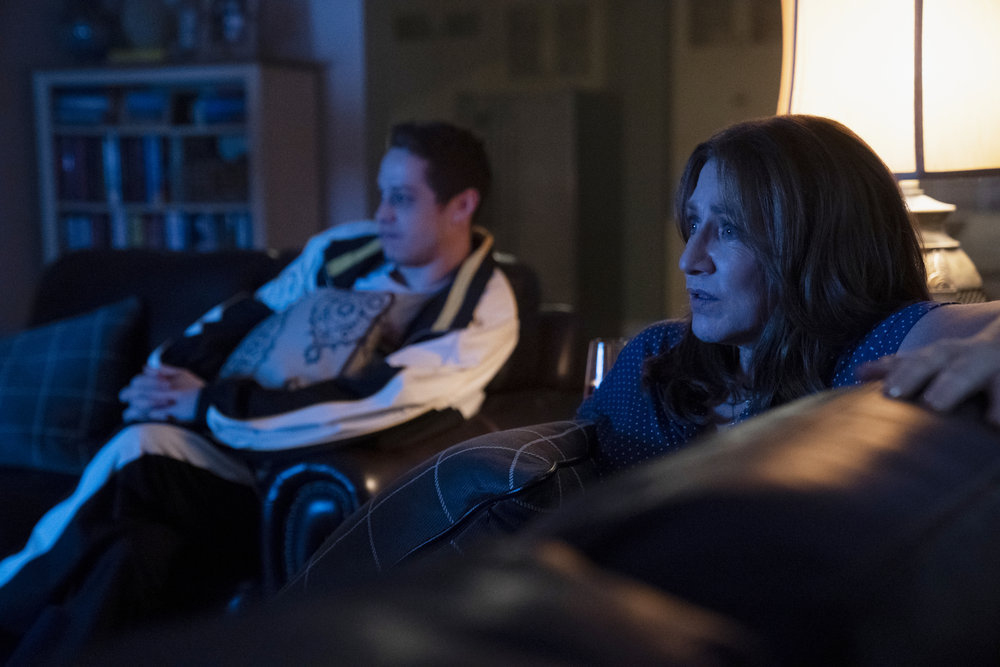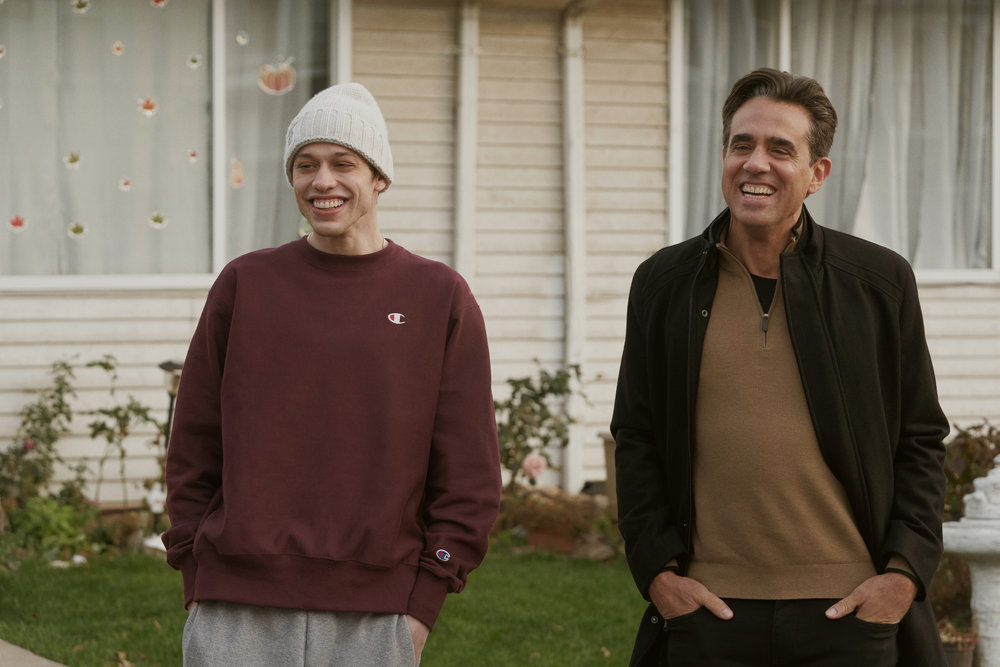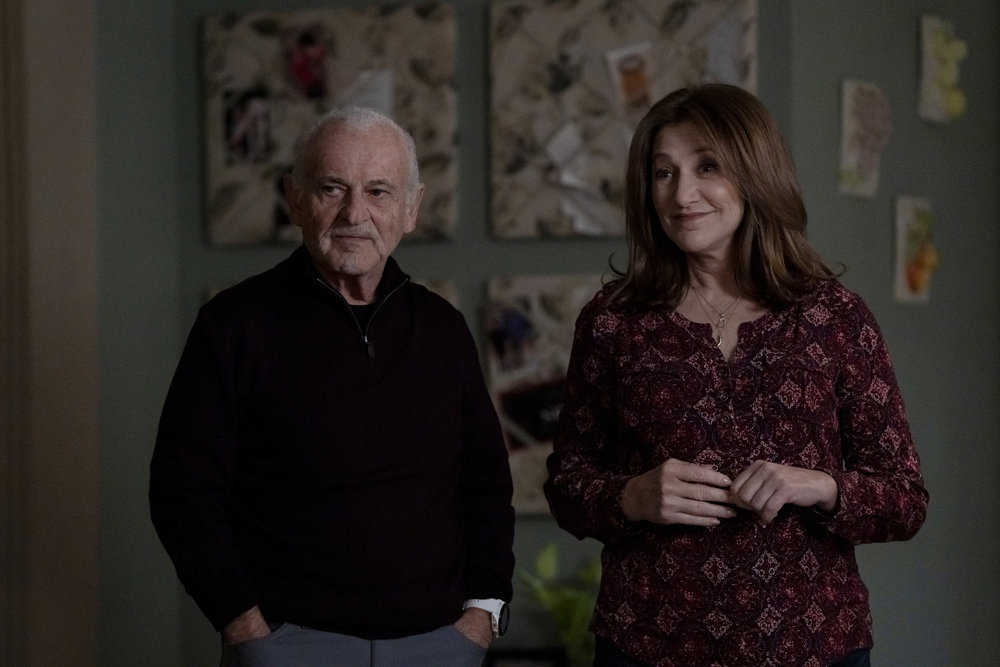“People think I’m, like, a joke for some reason,” Pete Davidson complains to his grandfather in the series premiere of Bupkis, a Peacock comedy that casts the SNL alum and tabloid magnet as a version of himself. Grandpa Joe, played by the semi-reclusive Joe Pesci in his first role since The Irishman, doesn’t flinch. “They see you as a joke because you are a joke,” he replies. “You run around like a kid, and you’re not a kid anymore. You’re a man.” What’s more: “You’re unhappy because all you do is try to make yourself happy. You should try to make somebody else happy once in a while.” Then he reveals he’s dying of cancer, the two vow to spend more time together, and Pete takes that promise as a hint that he should hire a sex worker for Joe.
It’s a silly episode—broad, sophomoric, and bookended by two stupid gags that place the star in cringe-worthy sexual situations involving members of his family. In other words, it’s precisely the kind of disappointment that viewers who already assume the worst of Davidson, with his chaotic presence in the celebrity news cycle, might have expected. The thing is, Davidson also has a talent for subverting expectations formed on the basis of a persona he can’t fully control. Like comedians from Richard Pryor to Larry David, he’s at his best when riffing on his public image. And, happily, the premiere is the weakest of Bupkis’ eight episodes. As the show, which debuts May 4, progresses, it evolves into something as distinctive and authentic as it is messy.

Loosely structured around Pete’s quest to follow his grandfather’s advice, Bupkis is a family dramedy more than a showbiz sitcom. While he’s occasionally on a movie set or speaking at an event, most of the time we see him in his home borough of Staten Island, where he lives in the toy-filled basement of a house occupied by his doting mother, Amy (Edie Falco). His younger sister, Casey (Oona Roche), is “the good kid,” training to become a physician’s assistant and starved for familial attention because Pete requires so much of it. Brad Garrett and Bobby Cannavale have recurring roles as cautionary-tale uncles who double as father figures for Pete—who, like the real Davidson, lost his firefighter dad on 9/11. Pete has plenty of issues to work through, but a lack of familial love isn’t one of them. Everyone wants to see him happy, though how they can help isn’t clear.
What, exactly, is his problem? First of all, the media won’t leave him alone. The series opens with Pete googling himself and encountering a barrage of headlines declaring him a “scumbro” with “butthole eyes” who must be on drugs. Fair enough: he is on drugs. That is perhaps his biggest issue, the one that keeps him dependent on an inner circle of juvenile enablers and leads to him blowing opportunities for romance, career advancement, and personal growth. But it’s also inseparable from mental health struggles that Bupkis traces back to Pete’s childhood.

Davidson, working with co-creators Judah Miller and Dave Sirus, doesn’t oversimplify a reality that he obviously understands better than the voices snarking at him from the clickbait mines. Neither does he wallow in self-pity. Fame may bring out the worst in Pete, but it’s not forcibly shoving pills down his throat or crashing his car at the cemetery where he shows up midway through a funeral. The tension between choices he can control and circumstances that are out of his hands fuels some of the season’s most insightful episodes. Stuck on a film shoot over Christmas in Canada, where what is supposed to be a scene opposite Brad Pitt turns out to be a depressing blue-screen pantomime with the A-lister’s stand-in, he actively exacerbates a bad situation by purchasing a mystery drug off some teens working at the local bowling alley.
Although it never again sinks to the level of the premiere, the show doesn’t coalesce into something more cohesive than an episodic comedy—a format better suited to a weekly rollout on linear TV than to a full-season streaming drop—until midway through the season. And if you’ve seen Davidson’s stand-up or watched him on SNL or in The King of Staten Island, the 2020 Judd Apatow movie in which he plays a non-famous character from a similar background, it might occur to you that he’s running out of mediums in which to retell the same handful of autobiographical stories. It’s a fair concern, though one tempered by the fact that he’s still under 30.

By writing what he knows, Davidson deglamorizes such clichéd tropes of fame as the entourage and surfaces a number of astute observations about his particular brand of notoriety. In one episode, Amy is frantic after reading reports of her son’s death; they’re false, but she can’t reach him because he let his phone die. (In real life, Davidson ended up in trauma therapy last summer when his then-girlfriend Kim Kardashian’s ex Ye posted a fake New York Times front page announcing the death of one “Skete Davidson.”) Meanwhile, Pete becomes obsessed with finding an internet troll who keeps uploading the same awful photo of him. A frank conversation with John Mulaney, appearing as himself, later in the season, finds the two comedians trying to reconcile their shared problems with the very different faces they each present to the world.
There are many more great guest appearances, from Steve Buscemi as a priest to a hilarious running Ray Romano gag that I won’t spoil here. Better yet are the ways in which Pesci’s gangster-movie brusqueness and Falco’s almost-suffocating warmth complement Davidson’s portrait of himself as a hapless overgrown child. For all its thoughtful engagement with drug abuse, mental illness, and the rest, Bupkis often made me laugh out loud. At one point, Pete improvises a ditty about why everybody hates him to the tune of “Mambo No. 5.” There’s an extended tribute to the absurdity of the Fast & Furious franchise. Through it all, as he undercuts preciousness around his psychology and undermines TV’s tendency to easily resolve what are actually lifelong struggles, Davidson proves to be the most competent narrator of his own story. He’s a funny guy, that’s for sure—but he’s certainly no joke.
More Must-Reads from TIME
- Caitlin Clark Is TIME's 2024 Athlete of the Year
- Where Trump 2.0 Will Differ From 1.0
- Is Intermittent Fasting Good or Bad for You?
- The 100 Must-Read Books of 2024
- Column: If Optimism Feels Ridiculous Now, Try Hope
- The Future of Climate Action Is Trade Policy
- FX’s Say Nothing Is the Must-Watch Political Thriller of 2024
- Merle Bombardieri Is Helping People Make the Baby Decision
Contact us at letters@time.com